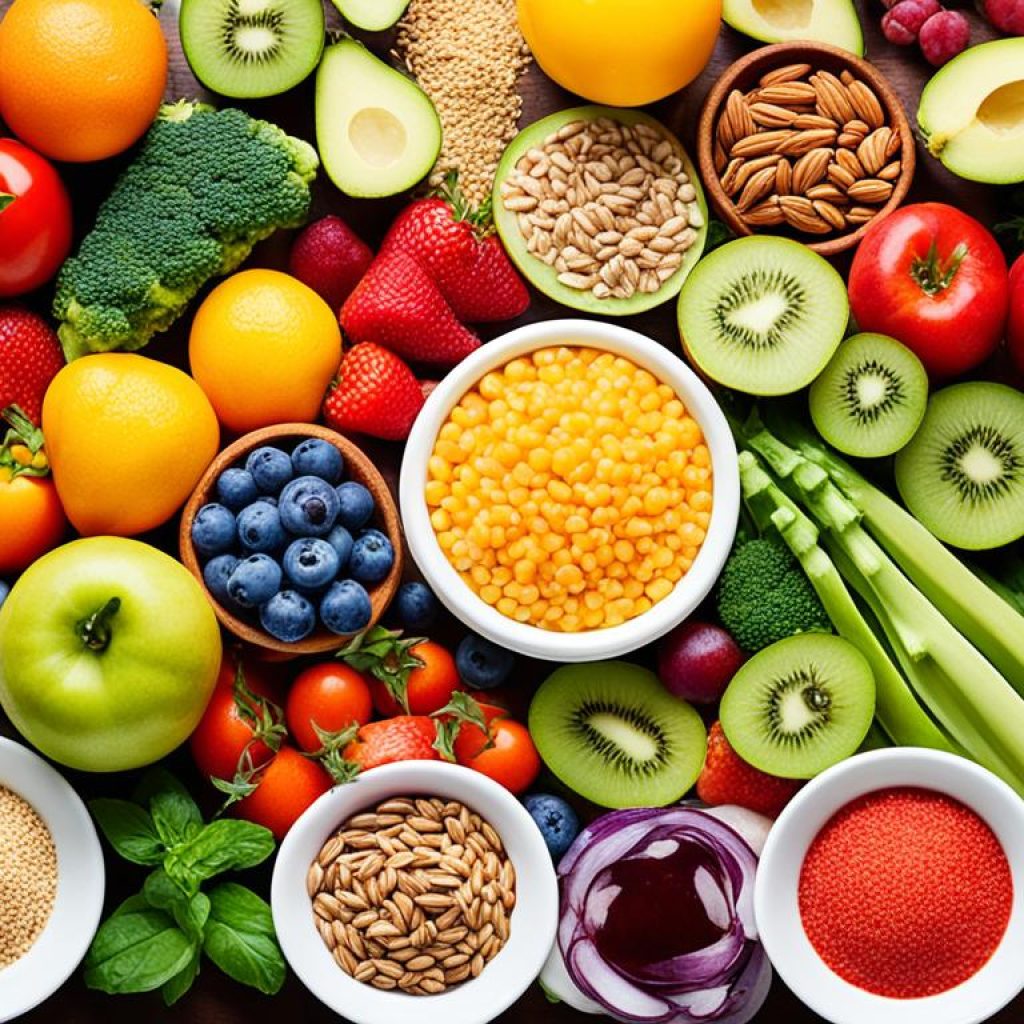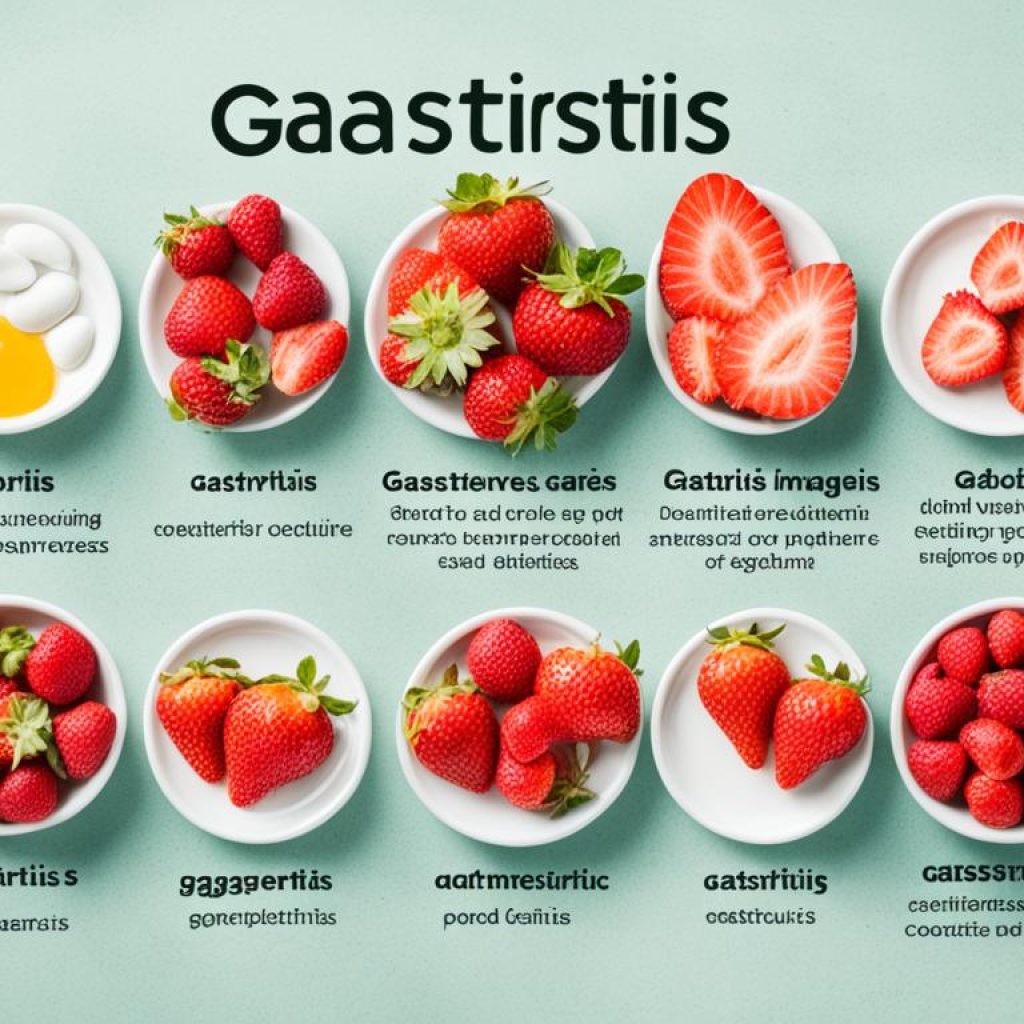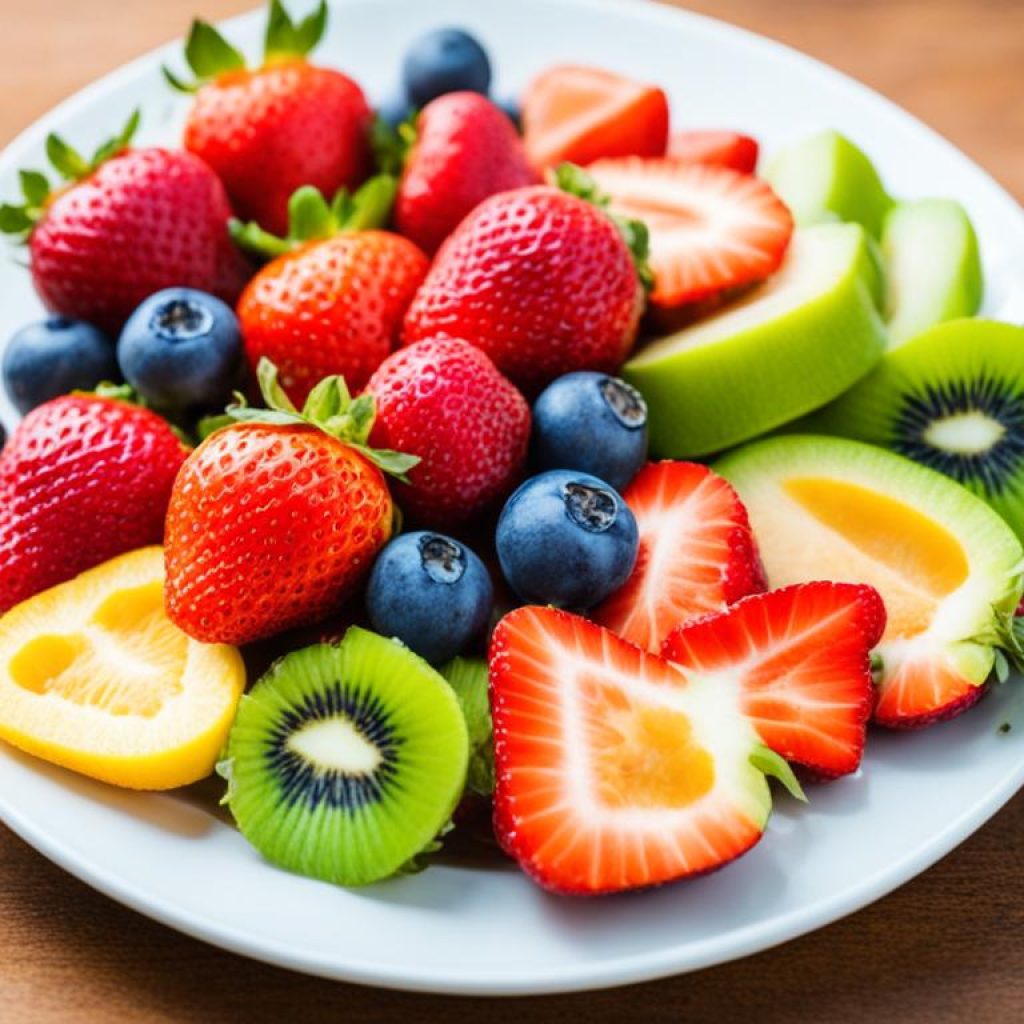Gastritis is a digestive condition characterized by inflammation of the stomach lining. While there is no specific diet that can treat gastritis, dietary choices can play a role in managing the condition. Some foods, such as strawberries, may have potential benefits for individuals with gastritis.
Strawberries are a good source of antioxidants and contain compounds that have been found to inhibit the growth of Helicobacter pylori (H. pylori), a bacteria commonly associated with gastritis. However, it’s important to note that individual tolerance and response to strawberries may vary, and it’s best to consult with a healthcare professional before making any major dietary changes.
Key Takeaways:
- Strawberries may have potential benefits for individuals with gastritis.
- Strawberries are a rich source of antioxidants.
- Compounds in strawberries can inhibit the growth of H. pylori bacteria.
- Individual tolerance and response to strawberries may vary.
- Consult with a healthcare professional before making dietary changes.
The Role of Diet in Managing Gastritis
Gastritis is a common digestive condition characterized by inflammation of the stomach lining. While there is no specific diet that can cure gastritis, making conscious dietary choices can help manage symptoms and promote stomach health. By incorporating recommended foods and avoiding trigger foods, individuals with gastritis can support their overall well-being.
When it comes to gastritis, the focus should be on consuming foods that are gentle on the stomach and have healing properties. Some gastritis-friendly foods that are beneficial include:
- Green tea, known for its anti-inflammatory properties and ability to reduce stomach acid production.
- Fresh fruits and vegetables, particularly berries, which are rich in antioxidants that protect the stomach lining from further damage.
- Broccoli, a cruciferous vegetable that contains sulforaphane, a compound with anti-inflammatory effects.
- Probiotic yogurt, which promotes a healthy gut microbiome and aids in digestion.
- Turmeric, a spice with anti-inflammatory properties that can help reduce stomach inflammation.
- Foods high in antioxidants, such as dark chocolate, nuts, and legumes, which have been shown to reduce inflammation and improve stomach health.
These recommended foods help protect the stomach lining, reduce inflammation, and inhibit the growth of Helicobacter pylori (H. pylori) bacteria, which is associated with gastritis.
Conversely, it’s important to avoid trigger foods that can exacerbate gastritis symptoms and prolong the healing process. Some foods to avoid include:
- Spicy foods, which can irritate the stomach lining and trigger inflammation.
- Alcohol, as it can increase stomach inflammation and the risk of bleeding.
- Acidic foods, such as citrus fruits and tomatoes, which can cause further irritation.
- Fried foods, which are high in fat and can be difficult to digest, worsening gastritis symptoms.
Following an anti-inflammatory diet that includes plenty of fresh fruits, vegetables, and plant-based foods can also be beneficial for individuals with gastritis.
Quote:
“A well-balanced diet that includes gastritis-friendly foods, alongside the avoidance of trigger foods, is key to managing symptoms and promoting better stomach health for individuals with gastritis.” – Dr. Emily Thompson
By incorporating these recommended foods and avoiding trigger foods, individuals with gastritis can take an active role in managing their condition and improving their overall well-being.
The Potential Benefits of Strawberries for Gastritis
Strawberries are a popular fruit known for their sweet and tart flavor, vibrant color, and numerous health benefits. They are rich in antioxidants, including flavonoids and anthocyanins, which have anti-inflammatory and antibacterial properties. These antioxidants may help reduce stomach inflammation and protect against cell damage.
According to some studies, strawberries also contain compounds that can inhibit the growth of H. pylori bacteria, which is associated with gastritis. While more research is needed to fully understand the potential benefits of strawberries for gastritis, incorporating them into a balanced and varied diet may have positive effects on stomach health.

| Benefits of Strawberries for Gastritis | |
|---|---|
| Rich in antioxidants | Flavonoids and anthocyanins found in strawberries have anti-inflammatory properties, which may help reduce stomach inflammation. |
| Potential inhibition of H. pylori bacteria | Some compounds in strawberries have been found to hinder the growth of H. pylori bacteria, a common cause of gastritis. |
Disclaimer: Individual tolerance and response to strawberries may vary. It is recommended to consult with a healthcare professional before making any major dietary changes.
Other Gastritis-Friendly Foods to Consider
In addition to strawberries, there are several other gastritis-friendly foods that can help manage symptoms and promote stomach health. Incorporating these foods into your gastritis diet may provide additional benefits and support your overall well-being.
1. Brassica Vegetables
Brassica vegetables, such as cauliflower, cabbage, and radishes, are rich in antioxidants and can help inhibit the growth of H. pylori bacteria. These vegetables also provide essential nutrients and fiber that can support digestive health. Including Brassica vegetables in your meals can be a delicious and nutritious way to manage gastritis.
2. Turmeric
Turmeric is a mild spice known for its anti-inflammatory properties. Its active compound, curcumin, has been shown to help reduce inflammation in the body. Including turmeric in your cooking or adding it as a spice to various dishes can be a flavorful way to support your gastritis diet.
3. Yogurt
Probiotic yogurt, particularly those containing live cultures like Lactobacillus and Bifidobacterium, can be beneficial for individuals with gastritis. Probiotics promote a healthy gut microbiome and may help reduce inflammation in the stomach. When choosing yogurt, opt for plain varieties without added sugars or artificial sweeteners.
4. Green Tea
Green tea is rich in antioxidants that can help protect the stomach lining and reduce inflammation. It is also a low-acid beverage, making it a suitable choice for individuals with gastritis. Enjoy a cup of green tea as part of your daily routine to support your stomach health.
5. Fresh Fruits and Vegetables
Fresh fruits and vegetables, such as apples, carrots, leafy greens, and cucumbers, are packed with vitamins, minerals, and fiber. These nutrient-dense foods can help support overall digestive health and provide a variety of gastritis-friendly options. Aim to incorporate a colorful array of fruits and vegetables into your meals and snacks.
6. Whole Grains
Whole grains, such as quinoa, brown rice, and whole wheat bread, are excellent sources of fiber and nutrients. They can help maintain regular bowel movements and support gut health. Including whole grains in your diet can provide a satisfying and nourishing foundation for your gastritis-friendly meals.
7. Lean Sources of Protein
To meet your protein needs while managing gastritis, opt for lean sources such as skinless poultry and fish. These options are generally easier to digest compared to fatty or processed meats. Incorporating lean protein into your meals can help maintain muscle mass and support overall health.

Remember, individuals with gastritis have different dietary tolerances, so it’s important to listen to your body and note any foods that may trigger symptoms. Keeping a food journal can help identify potential triggers and guide your gastritis-friendly meal planning.
“Incorporating a variety of gastritis-friendly foods into your meals not only supports your stomach health but also provides a delicious and nourishing eating experience.”
Foods to Avoid for Gastritis
While managing gastritis through diet can be beneficial, it’s equally important to be aware of the foods that should be avoided. Certain food choices can exacerbate symptoms and worsen gastric inflammation. Here are some foods that individuals with gastritis should steer clear of:
- Spicy Foods: Spices like chili powder, black pepper, and hot sauces can irritate the stomach lining, leading to increased discomfort and inflammation.
- Alcohol: Consuming alcohol can contribute to stomach inflammation and a heightened risk of bleeding. It’s best to avoid alcoholic beverages if you have gastritis.
- Acidic Foods: Citrus fruits, tomatoes, and other acidic foods can cause irritation and trigger symptoms such as heartburn and stomach pain. It’s advisable to limit or avoid these foods.
- Fried Foods: Foods that are deep-fried or heavily greased are high in fat and can be challenging to digest. They can worsen gastritis symptoms, so it’s best to steer clear of them.
- Processed Meats: Deli meats, sausages, and other processed meats contain high levels of preservatives and unhealthy fats, which can increase inflammation in the stomach. It’s better to opt for lean sources of protein instead.
By being mindful of these trigger foods and avoiding them, individuals with gastritis can minimize symptoms and promote better stomach health.

If you need further guidance on determining which foods to avoid or include in your gastritis diet, consult with a healthcare professional who can provide personalized advice based on your specific needs and condition.
Dietary Habits and Lifestyle Changes for Gastritis Management
In addition to specific dietary choices, certain habits and lifestyle changes can also help manage gastritis symptoms. Here are some recommendations to support your gastritis nutrition and overall well-being:
Eat Smaller, Frequent Meals
Instead of consuming three large meals, opt for smaller, more frequent meals throughout the day. This approach can help reduce the production of stomach acid and ease digestion, alleviating gastritis symptoms.
Manage Weight
Take steps to maintain a healthy body weight, as excess weight can increase the risk of developing gastritis. Gradual weight loss, if necessary, can be achieved through a combination of a balanced diet and regular exercise.
Antacids as Recommended
Consult with a healthcare professional to determine the appropriate use of antacids for symptom relief. These medications can help reduce stomach acid and provide relief from gastritis symptoms.
Consider Supplements
Omega-3 fatty acids and probiotics have shown potential benefits in promoting stomach health and reducing inflammation. However, it’s important to consult with a healthcare professional before starting any supplements, as they may interact with other medications and have potential risks.

Implementing these dietary habits and lifestyle changes can complement your gastritis-friendly foods and promote better symptom management. Remember to consult with a healthcare professional for personalized recommendations and guidance in managing gastritis.
Foods that Can Worsen Gastritis Symptoms
Alongside the recommended foods for individuals with gastritis, there are certain foods that can worsen symptoms and should be avoided. These include:
- Spicy foods: Spices like chili pepper, cayenne pepper, and black pepper can irritate the stomach lining, causing inflammation and discomfort.
- Alcohol: Excessive alcohol consumption can contribute to stomach inflammation and increase the risk of bleeding.
- Acidic foods: Citrus fruits, tomatoes, and acidic beverages like coffee and carbonated drinks can trigger stomach irritation and worsen gastritis symptoms.
- Fried foods: Deep-fried foods are high in fat content and can be difficult to digest, leading to increased discomfort for individuals with gastritis.
- Allergenic foods: Certain individuals may have specific food allergies or sensitivities that can trigger inflammation and exacerbate gastritis symptoms. Common allergenic foods include peanuts, shellfish, and gluten-containing grains like wheat.
For some individuals, an elimination diet may be helpful in identifying specific food triggers. This involves temporarily removing certain food groups from your diet and reintroducing them one by one to observe any adverse reactions. It can provide valuable insights into which foods may worsen gastritis symptoms on an individual basis.
Additionally, a high intake of salty and fatty foods can alter the stomach lining and increase the risk of H. pylori infection, which is associated with gastritis. It’s crucial to be mindful of these foods and make choices that support your stomach health.
Common Causes of Gastritis
Gastritis can be caused by a variety of factors, including:
- Infection with H. pylori bacteria
- Use of nonsteroidal anti-inflammatory drugs (NSAIDs)
- High alcohol consumption
- Certain inflammatory diseases
Complications of Gastritis
When left untreated, gastritis can lead to several complications, including:
- Ulcers in the stomach or small intestine
- Persistent pain and discomfort
- Bleeding, which can result in anemia
- Increased risk of stomach cancer
- Loss of appetite and unwanted weight loss
To prevent these complications, it’s important to address the underlying causes of gastritis and seek appropriate medical treatment.

“Gastritis can have various causes, including H. pylori infection, NSAID use, high alcohol consumption, and certain inflammatory diseases.”
Conclusion
In conclusion, when it comes to managing gastritis, incorporating strawberries into your diet may have potential benefits due to their antioxidant content and ability to inhibit the growth of H. pylori bacteria. However, it’s important to take a comprehensive approach to dietary choices for gastritis management. Following a balanced and varied diet that includes gastritis-friendly foods, while avoiding trigger foods, can contribute to better stomach health and symptom management. Additionally, making necessary lifestyle changes, such as eating smaller, more frequent meals and maintaining a healthy weight, can further support gastritis management.
It’s crucial to prioritize consultation with a healthcare professional for personalized recommendations and guidance in managing gastritis. They can provide specific dietary advice tailored to your individual needs and medical history. While strawberries may be beneficial for some individuals with gastritis, it’s important to remember that individual tolerance and response to this fruit may vary. Always consult with a healthcare professional before making any major dietary changes or adding new foods to your gastritis management plan.
In summary, while strawberries and other gastritis-friendly foods can be beneficial, there is no one-size-fits-all approach to managing gastritis. By adopting a holistic approach that encompasses dietary choices, lifestyle modifications, and professional guidance, individuals with gastritis can take control of their health and optimize their management of this condition.
FAQ
Can I eat strawberries if I have gastritis?
While individual tolerance may vary, strawberries have potential benefits for individuals with gastritis. They are a good source of antioxidants and contain compounds that can inhibit the growth of H. pylori bacteria, commonly associated with gastritis. However, it’s best to consult with a healthcare professional before making dietary changes.
What foods are recommended for gastritis?
Recommended foods for gastritis include green tea, fresh fruits and vegetables (particularly berries), broccoli, probiotic yogurt, turmeric, and foods high in antioxidants. These foods can protect the stomach lining, reduce inflammation, and inhibit the growth of H. pylori bacteria.
Do strawberries have any potential benefits for gastritis?
Strawberries are rich in antioxidants and contain compounds that have anti-inflammatory and antibacterial properties. Some studies suggest that strawberries can inhibit the growth of H. pylori bacteria associated with gastritis. However, more research is needed to fully understand their effects on gastritis specifically.
What other gastritis-friendly foods should I consider?
Other gastritis-friendly foods include cauliflower, cabbage, radishes, turmeric, broccoli, yogurt (particularly probiotic yogurt), green tea, fresh fruits and vegetables, whole grains, and lean sources of protein like skinless poultry and fish.
What foods should I avoid if I have gastritis?
It’s advisable to avoid spicy foods, alcohol, acidic foods, fried foods, and processed meats, as they can worsen gastritis symptoms. These foods can irritate the stomach lining, contribute to inflammation, and make digestion more difficult.
What dietary habits and lifestyle changes can help manage gastritis?
Eating smaller, more frequent meals, maintaining a healthy weight, and using antacids as recommended by a healthcare professional can help manage gastritis symptoms. Some individuals may also benefit from supplements like omega-3 fatty acids and probiotics, but it’s important to consult with a healthcare professional before starting any new regimen.
Are there any foods that can worsen gastritis symptoms?
Yes, spicy foods, alcohol, acidic foods, fried foods, and certain allergenic foods can worsen gastritis symptoms. Additionally, a high intake of salty and fatty foods can increase the risk of H. pylori infection and negatively impact the stomach lining.
What are the common causes and complications of gastritis?
Gastritis can be caused by H. pylori infection, nonsteroidal anti-inflammatory drug use, high alcohol consumption, and certain inflammatory diseases. If left untreated, gastritis can lead to complications such as ulcers, persistent pain, bleeding, and an increased risk of stomach cancer.
What is the role of diet in managing gastritis?
While there is no specific diet that can cure gastritis, dietary choices can play a role in managing the condition. Following a balanced and varied diet that includes gastritis-friendly foods and avoiding trigger foods can help reduce inflammation, protect the stomach lining, and manage symptoms.
What is the conclusion regarding strawberries and gastritis management?
While strawberries have potential benefits for individuals with gastritis, it’s important to approach dietary choices for gastritis management comprehensively. Alongside incorporating gastritis-friendly foods like strawberries, following a balanced diet, making necessary lifestyle changes, and consulting with a healthcare professional can contribute to better stomach health and symptom management.

